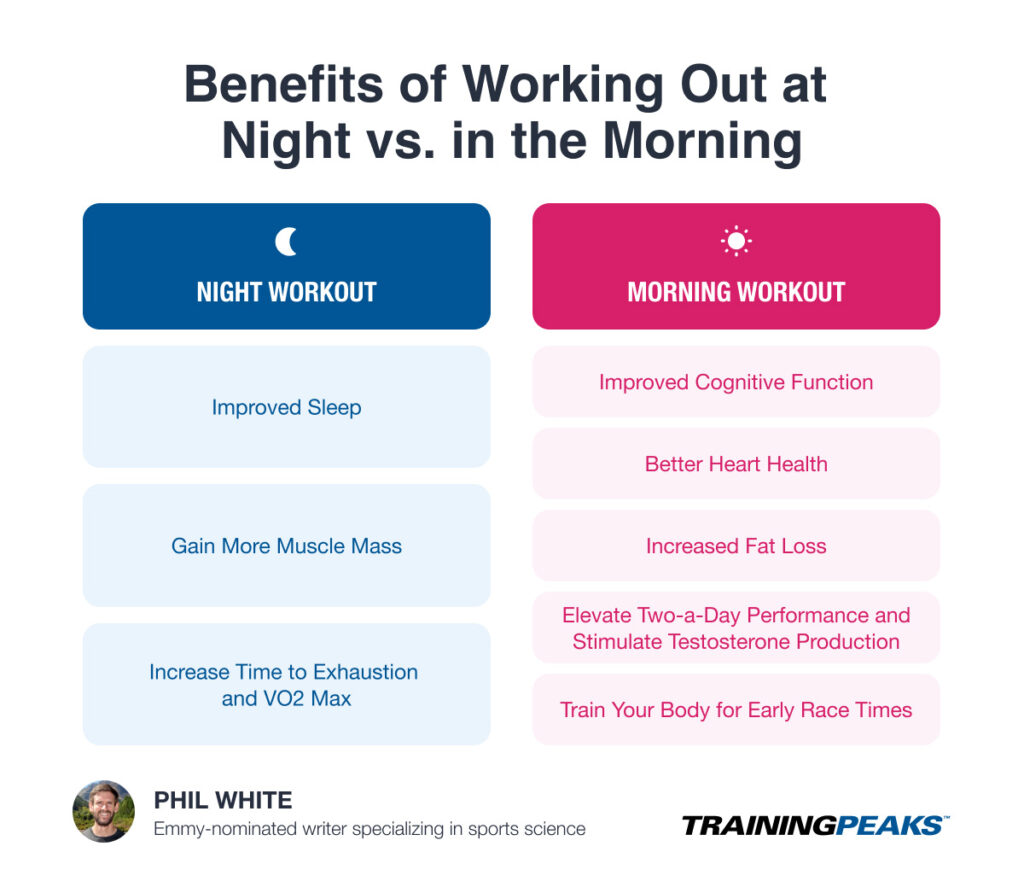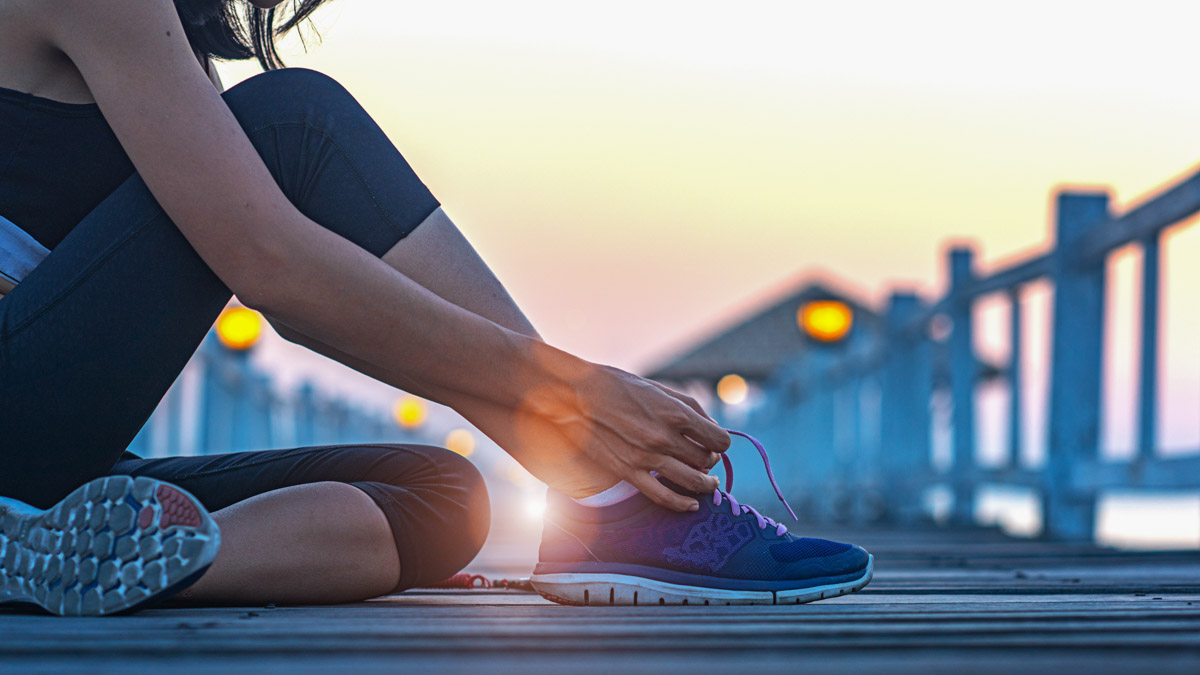In a recent TrainingPeaks article, I shared some reasons why morning workouts might be the way ahead for you, including simulating early race times, improving cognitive function, and elevating two-a-day performance. Now let’s look at the other end of the day and explore why training in the evening can be beneficial.
Improved Sleep
Some sports require their athletes to show up early for practice regardless of what their preferences are. A paper published in the International Journal of Exercise Science looked at the sleep habits of collegiate competitors via their wearable data and found that on nights before early morning training, they got significantly less sleep than before non-training days.
The authors noted that sleep duration was correlated with improved recovery status and that the less the athletes slept, the more anxious they became. They recommended that coaches consider shifting training times later to let their athletes sleep more. If you have control of your schedule, you might want to do likewise to make sure you’re not shortchanging your slumber.
One of the loudest counterarguments to this advice has been the notion that nighttime workouts stimulate the nervous system too much and put you in a sympathetic fight-or-flight state that makes parasympathetic recovery less likely — in short, making it harder to fall asleep. But a team of Finnish exercise physiologists wrote that although conventional wisdom has advised against intensive exercises within three hours of bedtime, “this recommendation has not been adequately tested experimentally.”
They sought to remedy the situation by asking a group to cycle to exhaustion in the evening. They then measured heart rate, subjective sleep quality, and heart rate variability afterward. Although the researchers found that autonomic control of the heart during the first three hours of slumber might have been impacted, they concluded that “vigorous late-night exercise does not disturb sleep quality.” So you can put this particular myth to bed and crack on with your evening workouts.
Gain More Muscle Mass
If you’re pushed for time, you might, on occasion, try to combine endurance and strength training in the same workout. A study released via Applied Physiology, Nutrition, and Metabolism examined how doing such a session impacted outputs when performed in the morning or at night. “The present results indicate that combined strength and endurance training in the evening may lead to larger gains in muscle mass,” they concluded, noting that such an adaptation occurred to a greater degree in weeks 13 to 24. Other studies have found that evening workouts also increase strength and power output.
Another trial by researchers from the University of Alberta in Canada examined the leg strength of participants who said they were either early birds or night owls beforehand at four different times. They found that while the early wakers’ results remained consistent, the late risers did far better at night. Commenting on the story to a CNN reporter, co-author Olle Lagerquist speculated that maximal nervous system drive peaks in the evening for night owls, leading to an increase in motor cortex and spinal cord excitability.
In other words, your chronobiology has an impact on when you’re primed for peak performance, and if you’re not a morning person, evening workouts might be better suited to your chronotype. The graphic below illustrates what benefits morning birds or night owls can expect from working out at their preferred time of day.

Increase Time to Exhaustion and VO2 Max
Nighttime workouts can also improve certain endurance parameters. A study out of the University of North Texas found that although participants in an evening stationary bike test were less efficient than in the morning, they increased their time to exhaustion by almost 20%, VO2 max by 4%, and anaerobic capacity by 7%, as well as being able to get their max heart rate higher.
One of the most recent investigations in this area was published in Biology of Sport. A group of Tunisian, German, and French physiologists asked 12 well-trained subjects to complete a 10-kilometer time trial in the morning and evening. They finished faster in the later session and, like in the first strength study referenced earlier, also had higher body temperature. Just as in the UNT study, the researchers noted increased VO2 max at night, also observing improved glucose metabolism and a slightly elevated lactate threshold. Combined, they saw these variables “contributing to a better cycling performance in the evening compared to the morning.”
If you’re a late riser, want to maximize your strength gains, or are seeking to improve your time trial performance, then evening workouts might be the best fit for your physiology and calendar. But don’t rule out training earlier or doing a combination of both, as this can be equally effective, particularly if you’re naturally an early bird.
The key to maximizing the physical, mental, and overall health benefits of training is not precisely when you train, but that you do it regularly and sustainably. As long as you’re showing up and doing high-quality work more often than not, you should be able to get to your goals no matter what end of the day you prefer to run, ride, lift, etc. But if you’re a night owl, it might be easier to do so with nighttime sessions.
References
Hill, D.W. (2013, September 13). Morning-evening differences in response to exhaustive severe-intensity exercise. Retrieved from https://pubmed.ncbi.nlm.nih.gov/24476482/
Küüsmaa, M. et al. (2016, December). Effects of morning versus evening combined strength and endurance training on physical performance, muscle hypertrophy, and serum hormone concentrations. Retrieved from https://pubmed.ncbi.nlm.nih.gov/27863207/
Landau, E. (2009, July 9). Study: Night owls may benefit from evening strength. Retrieved from http://www.cnn.com/2009/HEALTH/07/09/night.owl.morning/index.html
Merfeld, B. et al. (2022). The Impact of Early Morning Training Sessions on Total Sleep Time in Collegiate Athletes. Retrieved from https://digitalcommons.wku.edu/ijes/vol15/iss6/4/
Myllymäki, T. et al. (2011, March). Effects of vigorous late-night exercise on sleep quality and cardiac autonomic activity. Retrieved from https://pubmed.ncbi.nlm.nih.gov/20673290/
Souissi, W. et al. (2021, February 19). Higher evening metabolic responses contribute to diurnal variation of self-paced cycling performance. Retrieved from https://pubmed.ncbi.nlm.nih.gov/35173357/








